Landschlacht, Switzerland, 13 October 2017
There are some things that I don´t enjoy about working at Starbucks: shift work, impolite customers, how horribly messy the customers can be, how terrible things can become when things get insanely busy, especially with the arrival of autumn and the annual St. Gallen OLMA fair on now.
No job is perfect.
As well, no person is perfect at their job 100% of the time.
I´m certainly not.
But to justify supporting an employee, standards are set that he/she must meet.
From the bottom rung of humble baristas, such as myself, to shift managers, to store managers, to district managers, all the way to corporate HQ in faroff Seattle.
Above: Starbucks Corporation Headquarters, Seattle, Washington, USA
The job is defined, standards are set, and, hopefully, those hired by the company will do their jobs by the set standards.
If one doesn´t do his/her job as he/she should, then it is no great surprise to find that person asked to leave the position.
Politics shouldn´t be that far removed from business practices.
National leaders have their jobs defined, by either constitutions or by, the basest standard of measurement, the welfare of those for whom he/she has been entrusted responsibility.
Standards are set, either through comparisons with other current counterparts in a similar position of power or through comparisons with those who previously held the position.
Depending on the system of government by which a nation is administered, an unsuitable leader is forced to relinquish power if he/she is not following the constitution by which the country defines itself or if the welfare of the people has become so unpleasant that legal or even violent methods are sought to force the leader out.
Which brings me to the topic of two leaders, a century and an ocean apart….
In America there are three ways to end a presidency: vote him out of office in the following election, impeachment, and assassination.

Assassination is usually a bad idea, for it creates a martyrdom of that presidency.

Above: The assassination of President Abraham Lincoln by John Wilkes Booth, Ford Theater, Washington DC, 14 April 1865
Election is the normal course, if the dislike of a particular president is less a consequence of wrongdoing the president has done as it is a preference for a different candidate, then folks will willingly, albeit begrudgingly, wait until the customary time for re-election is due and then not return the president to power.
Impeachment is reserved for times when the President has already proven himself unsuitable for the position based on the dual standards of the rules set out by the US Constitution and by the intolerable welfare of the American populace.
At present, the United States is administered by Donald John Trump, a man uniquely unsuitable for the position of President.

Above: Donald John Trump, 45th US President since 2016
At present, his popularity wavers in the low 30s percentage mark.
So, is there a case for impeachment?
“Impeachment will proceed from the misconduct of public men, or, in other words, from the abuse or violation of some public trust, and they relate chiefly to injuries done immediately to the society itself.” (Alexander Hamilton, The Federalist)

Above: Alexander Hamilton (1755 – 1804)
“History is not geometry and historical parallels are never exact, yet a president who seems to have learned nothing from history is abusing and violating the public trust and setting the stage for a myriad of impeachable offenses that could get him removed from office.” (Allan J. Lichtman, The Case for Impeachment)

What follows is an abridgement of Lichtman´s excellent abovementioned book….
The President is the nation´s chief executive and commander in chief of its armed forces, but herein lies the danger that a President might pervert his administration into a scheme of oppression, or betray his public trust to foreign powers.
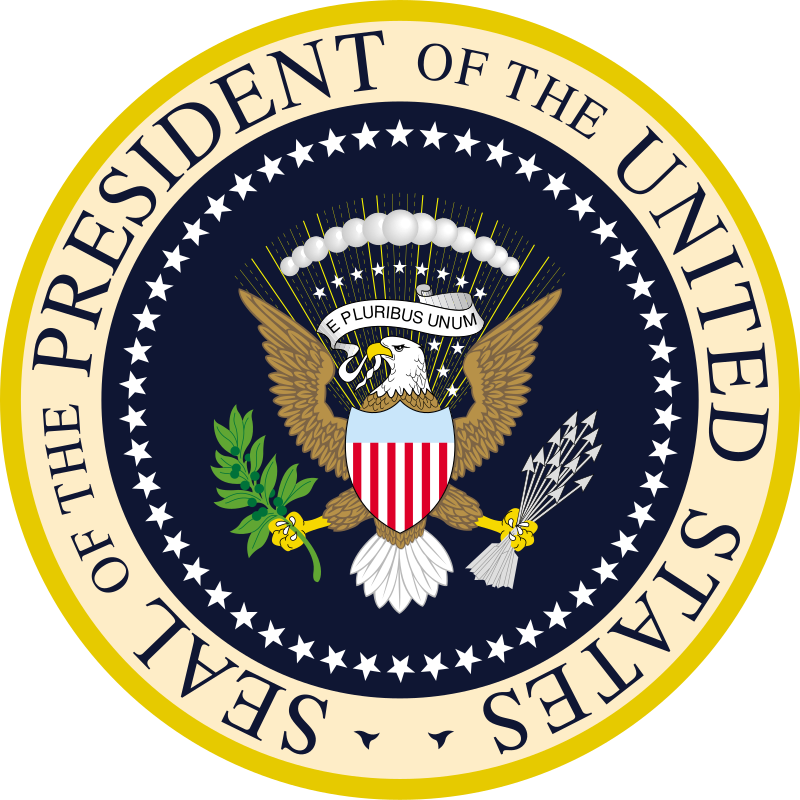
To keep a rogue president in check, power in America is shared by three independent branches of government, but a determined President can crash through these barriers.
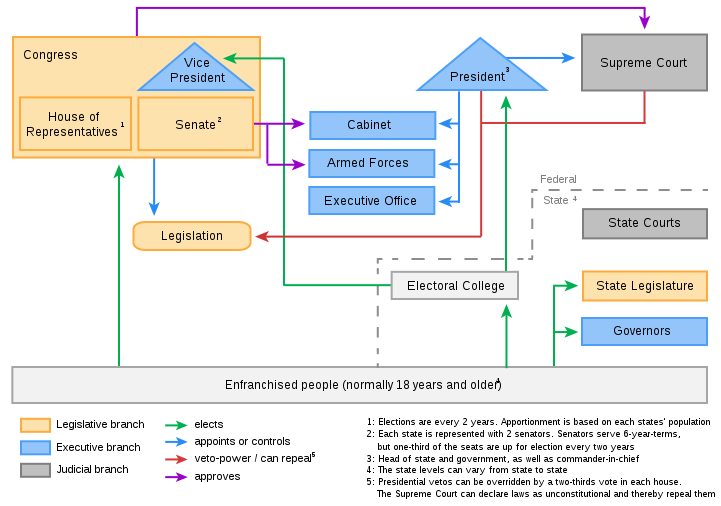
Above: The political system of the United States
So, impeachment exists as the final solution to remove an unsuitable President before an election or before his/her term is due to end.
“The genius of impeachment is that it could punish the man without punishing the office.” (Arthur Schlesinger, Jr.)
The impeachment of a President is rare.
America has seen the impeachment of only two Presidents: Andrew Johnson in 1868 and Bill Clinton in 1998.
Both were acquitted after impeachment by the Senate.

Above: Andrew Johnson (1808-1875), 17th US President (1865-1869)

Above: William Jefferson Clinton, 42nd US President (1993 – 2001)
Richard Nixon avoided impeachment by resigning.

Above: Richard Nixon (1913-1994), 37th US President (1969-1974)
One in fourteen US Presidents has faced the possibility of impeachment.
Trump has broken all the rules.
He has stretched presidential authority nearly to the breaking point, appointed cabinet officials dedicated to destroying the institutions they are assigned to run, and has pushed America toward legal, military and constitutional crisis.
No previous President has entered the Oval Office without a shred of public service or with as egregious a record of enriching himself at the expense of others.

Trump´s penchant for lying, disregard for the law and conflicts of interest are lifelong habits that permeate his entire Presidency.
He has a history of mistreating women and covering up his misdeeds.

Above: The Women´s March, the largest single day protest in US history, 21 January 2017
He commits crime against humanity by reversing the battle against catastrophic climate change.
His dubious connections to Russia could open him up to a charge of treason.

Above: The flag of Russia
There are standards of truthfulness that a President must uphold.
There is a line between public service and private gain.
A free press is needed for a democracy to function.
A country should be immune against foreign manipulation of its politics.
A President has a responsibility to protect his people and, where applicable, the world.
By all these standards, Donald J. Trump has failed as a President.
As I have previously stated in this blog, impeachment is only possible with the majority vote of the US House of Representatives, which is controlled by the Republican Party whom Trump represents.

Only when Republicans themselves become convinced that Trump has committed high criminal offenses against the United States, that he imperils public safety and is unwell to occupy the Oval Office, then and only then will impeachment become a possibility.
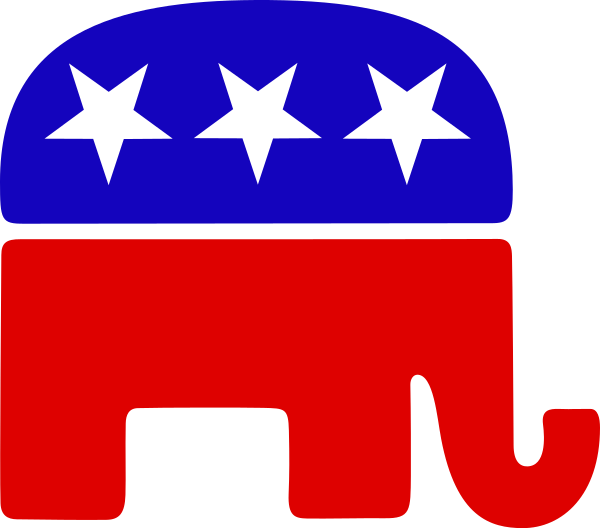
Above: Logo of the US Republican Party
Trump could be convicted for illegal acts that occurred before he assumed office, for the Constitution specifies no time limit on any of its impeachable offenses: violation of the Fair Housing Act, the fraudulent charity Trump Foundation which is not legally registered, violation of the federal government´s strict embargo against spending any money for commercial purposes in Cuba, the fraudulent Trump University, and his exploitation of undocumented immigrants to build Trump Tower and in Trump Model Management.

Above: Trump Tower, Trump Organization HQ, New York City
To guard against foreign leverage on a President, the Constitution has a provision known as the Emoluments Clause, which says that “no title of nobility will be granted by the United States, and no person holding any office of profit or trust under them, shall, with the consent of Congress, accept of any present, emolument, office or title of any kind whatever, from any king, prince or foreign state.”
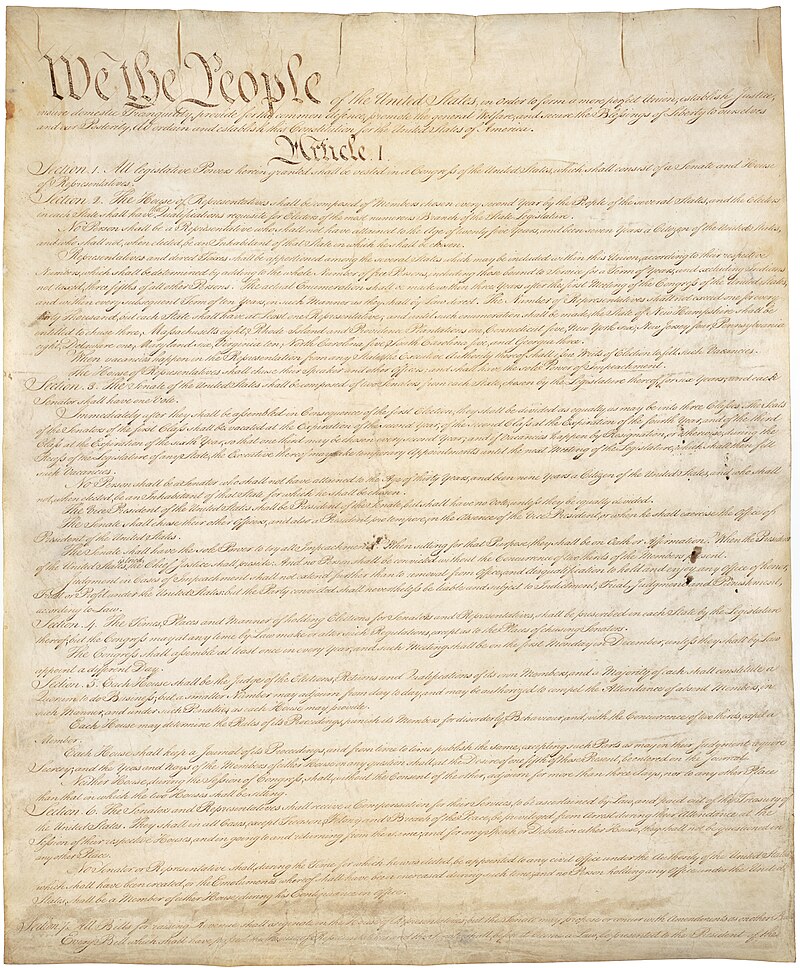
Above: Page 1 of the original US Constitution (1787)
The Emoluments Clause prohibits all federal officials, including the President, from receiving anything of value from foreign governments and their agents.
The prohibition is absolute.
No amount is specified.
A quid pro quo is not required to trigger a violation.
The Trump Company has millions invested in the Philippines and Trump´s profits depend on the good faith of the Filipino agent in the United States.

Above: The flag of the Philippines
The Trump Company has been granted a valuable trademark right for the use of the Trump name in the construction industry in China.

Above: The flag of the People´s Republic of China
Which begs the question of whether there is a quid pro quo agreement between the President and China.
Besides China and the Philippines, there are more than twenty nations in which Trump has business connections.
Does Trump distinguish his economic interests from the interests of the United States?
Trump businesses are heavily laden with debts that give lenders leverage over the Presidency.
According to the Wall Street Journal, Trump owes more than a billion dollars to some 150 financial institutions.

“The problem with any of this debt is if something goes wrong and there is a situation where the President is suddenly personally beholden or vulnerable to threats from the lenders.” (Trevor Potter)
Trump and his appointees make policy and regulatory decisions that affect these lenders.
Federal regulators have sanctioned one of Trump´s largest creditors, Deutsche Bank for fraud and the laundering of money from Russia.

Above: Logo of Deutsche Bank
Trump also has debts in China.
“Trump´s election may usher in a world in which his stature as the US President, the status of his private ventures across the globe, and his relationships with foreign business partners and the leaders of their governments could all become intertwined.” (Rosalind Helderman/Tim Hamburger)
Already, there is a lawsuit, brought by a bipartisan group called Citizens for Responsibility and Ethics in Washington (CREW), which accuses Trump of having violated the Emoluments Clause.

Above: The White House
Trump´s domestic interests violates other federal laws.
The Stop Trading on Congressional Knowledge (STOCK) Act prevents members of Congress and other federal employees from reaping private economic benefits through access to nonpublic governmental information.

“If Trump continues to own his businesses and he uses insider information or information he has as President, then arguably it is a violation of the STOCK Act.” (Larry Noble)
The Act also applies to any nonpublic information that Trump provides family members.
Withholding his tax returns, Trump makes it difficult to distinguish between benefits flowing to him personally versus those flowing to members of his family.

Above: Page 1, Form 1040, US tax return form, 2005
Then there is the question of conflicts of interest.
Trump has been urged to sell his interests in all his properties, to liquidate his debts and to put his remaining assets in a blind trust, administered by a third party who would not report to the President or his family any details of financial transactions.

Instead Trump handed over management of his enterprises to his children.
Trump retains all ownership and licensing rights to his enterprises and continually and personally profits from all his businesses.
The list of conflict-making presidential decisions cuts across virtually the entire range of national policies, including taxation, regulation, infrastructure spending, government contracts, trade, military operations, relations with foreign leaders, and so on.
A technical violation of the law is not necessary to trigger impeachment.
Any subordination of America´s national interests to Trump´s financial interests will suffice.
Donald Trump is a liar.
His lies have profited him in business, burnished his image, helped him fight thousands of lawsuits and won him the White House.
It is his reflex response to any challenge or opportunity.
Legally, Trump can lie while in office, but if he lies intentionally on a material matter in sworn testimony, that is a crime known as perjury.
Lying to Congress or to federal officials is also an impeachable offense.
The US Supreme Court has ruled that a President cannot be sued for his official duties, but is not otherwise immune from lawsuits involving unofficial conduct, whether before or after assuming office.

If Trump is sued and forced to testify under oath and lies, this could lead directly to his impeachment.
If Trumps corrupts the government information upon which an informed citizenry depends, this is another avenue to impeachment in that his lies threaten national credibility and trust.
Is Donald Trump a traitor?
If it can be proven that there was some level of collusion between Trump or his agents and a foreign power to manipulate the results of an American election, then Trump could be charged with treason.
No one in Congress will tolerate a compromised or treasonous President.
Impeachment and trial will be quick and decisive.
Trump may be destined for impeachment for egregious abuses of power.
Through his travel bans, Trump has violated the letter and spirit of the Immigration Act, which rejects nationality quotas and states that no person can be “discriminated against in the issuance of an immigration visa because of the person´s race, sex, nationality, place of birth or place of residence”.
The travel bans violate the First Amendment´s prohibition against “an establishment of religion”, which forbids any government to favour one religion over another.
The travel bans violate the Fifth Amendment, which prohibits the government from depriving individuals of their “life, liberty or property, without due process of law”.
The Whistleblowers Protection Act protects the rights of federal employees to report misconduct, without retaliation or reprisals.
Some 1,000 professional American diplomats submitted a dissent memo declaring that Trump´s ban was discriminatory.
They were told that they “should either get with the program or they can go”.
Trump fired Acting Attorney General Sally Yates when she refused to defend his travel ban in court, because she believed, in good conscience, that the ban violated American law.
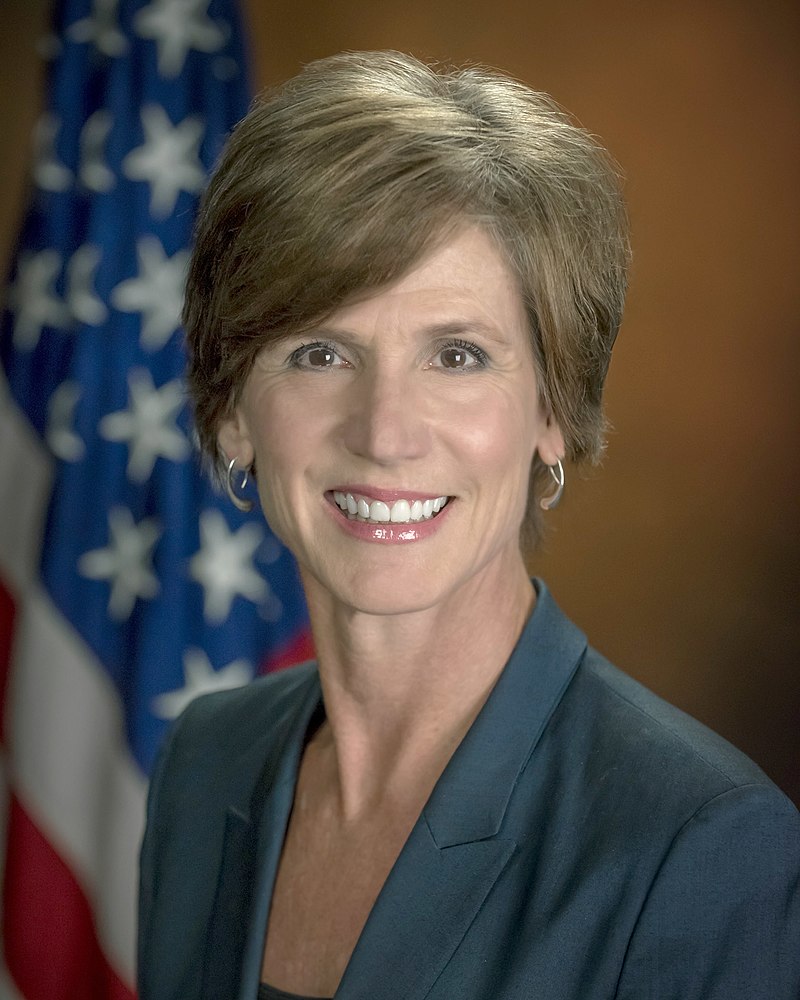
Above: Sally Yates, US Attorney General (2017)
In drafting his travel ban, Trump did not consult with Congress or any pertinent committees.
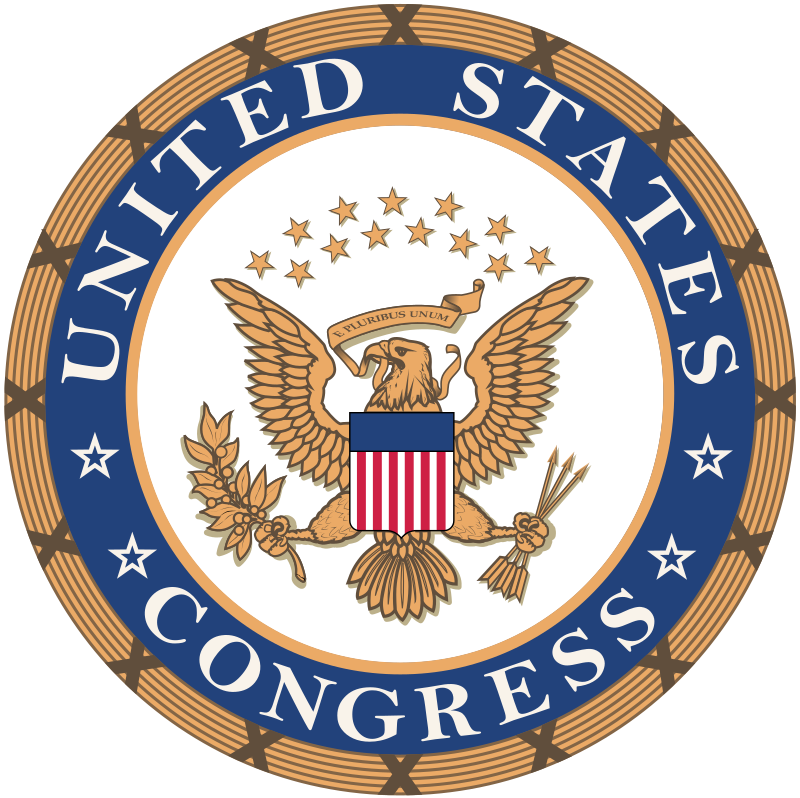
Instead Trump recruited staff members of the House Judiciary Committee to assist in drafting the executive order, without prior consultation with their bosses, imposing on them confidentiality agreements.
The unauthorised use of congressional staffers and the coercing upon them of gag orders, violates the separation of powers between the executive and Congress.
When Senior Federal District Court Judge James L. Robart issued an injunction halting implementation of Trump´s travel ban, Trump responded by waging war on the judiciary suggesting that the Courts will be to blame for any future terrorist attack upon US soil.
Trump´s dispargement of the Judiciary raises concerns that, in the event of another terrorist incident, Trump will blame the Courts and his political enemies as a pretext for taking total control under martial law.
To eliminate another check on his powers, Trump discredits any reporting that does not follow his propaganda line as “fake news” by the “very dishonest press”.
The White House has barred from press briefings selected outlets that have reported news critical of the administration.

Above: President George W. Bush unveiling the James Brady White House Press Briefing Room, 11 July 2007
He continues to threaten suppression of those news sources he disapproves of.
Even if President Trump does not brazenly violate the First Amendment through censorship, he can still be impeached for his war on the press as an abuse of presidential power.
Issues surrounding Trump´s temperament raise the question of whether he might be charged with “incapacity”.
The Twenty-Fifth Amendment provides a means for removing a President for disabilities – not limited to the physical – that render him unable to fulfill the duties of office.
It is a procedure that has never been used to remove a President and requires the cooperation of the Vice President and the cabinet.
Should Trump challenge this declaration, then Congress must declare him incapable by at least a two-thirds vote.
Mental health professionals have already challenged Trump´s mental fitness to govern.
By the standard of ensuring that the citizenry under his control are provided for, Trump has again failed.
From his desire to remove millions of Americans from health coverage, to his unwillingness to ensure American safety from the overabundance of and lack of regulation of guns, to his provocation of North Korea in a game of nuclear roulette, to his reversal of needed climate change legislation and cooperation, to his unwilling reluctance to assist a devastated Puerto Rico, Trump has proven again and again of his unfitness to govern America.
Perhaps it is not a question of whether Trump will be impeached but more of a question of when?
A similar inevitable scenario existed in Russia a century ago….
To be fair, Tsar Nicholas II had powers that Trump could only dream of, but there are definite parallels that can be drawn between Nicholas and Trump and why these parallels led to the necessary abdication of Nicholas as Tsar of Russia.
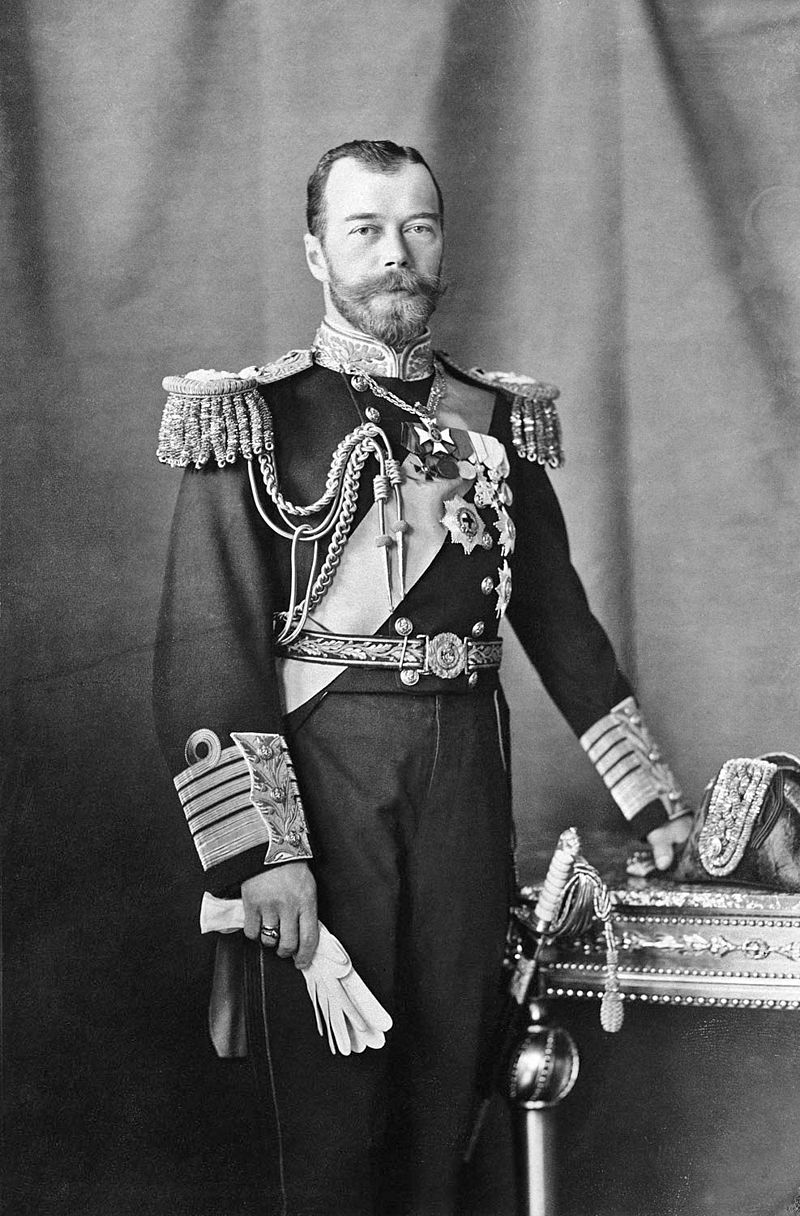
Above: Nicholas II of Russia (1868-1918), Tsar (1894-1917)
The Russian Revolution did not come of the blue.
The dress rehearsal for the events of 1917 took place in 1905.
1904 had seen military defeat by the Japanese, starvation and discontent in the countryside, appaling living and working conditions in the cities, and the spread of socialist and democratic ideas among the intelligentsia.
These all came together on 9 January 1905, Bloody Sunday, when the Imperial Guard in St. Petersburg gunned down hundreds of unarmed demonstrators.
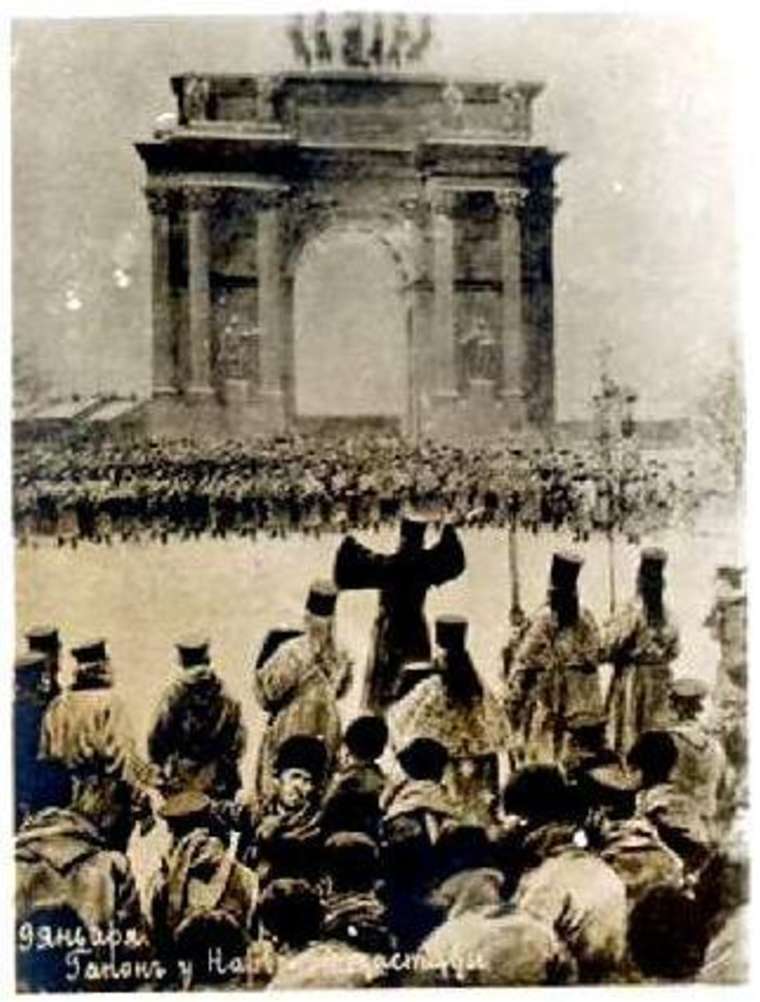
The result was a mortal blow to the credibility of Nicholas II and his regime.
Massive nationwide strikes and demonstrations forced the Tsar to accept the first-ever representative assembly in Russian history, the Duma.
This concession brought a few years of precarious stability.
The next few years saw a bitter tug of war between a Tsar, who was intent on maintaining his autocratic power, and a series of Dumas demanding economic and political reform.
With the abandonment of serious efforts at reform, rising social disorder and discontent was Russia´s entry into the First World War in 1914.
Russian society pulled together in the face of a common enemy.
Strikes stopped.
Agitators were jalied.
There were huge patriotic demonstrations.
But as the War dragged on, the resulting military humiliation and rising economic discontent, was the final nail in the coffin of the tsarist regime.
The War took Nicholas far away from Petrograd (the new, patriotic name for St. Petersburg) to command his troops.
(Like Trump, Nicholas thought himself to be a military leader.
He wasn´t.
Trump isn´t.)
Government was left in the hands of the capricious and incompetent Tsarina Alexandra.

Above: Alexandra Feodorovna (1872-1918), Tsarina (1894-1917)
The standing of the Tsar reached rock bottom, with even members of his own family plotting to remove him.
Rising popular discontent came to a head with bread riots in Petrograd.
After some attempts at suppression the army joined the rioters.
Nicholas was asked by the Duma to respond directly in Petrograd.
On his train, Nicholas was virtually incommunicado.
Russia had only a provisional government sharing its powers with a workers´ soviet.
The temporary government needed the aura of authority through which to yield power, while the soviet knew its powers need not extend beyond the capital.
The people needed a legitimate sense that order would indeed be reestablished.
It was clear that Nicholas had long ago failed them, but, sheep need a shepherd, someone needed to lead and organise.
Nicholas needed to abdicate and someone needed to replace him.
Trump needs to be impeached and someone is needed to replace him.
Nicholas, like Trump a century later, had shown no willingness to accept advice, to grow in his role, to internalise criticism or to show restraint.
Nicholas, like Trump, lacked the protection of a wide popular mandate.
Both men fought to keep their power regardless of the damage wrecked on others.
Trump´s end has yet to be written.
What follows soon in this blog is how Nicholas´ chapter drew to a close and how an exile in Switzerland would seize the fall of a Tsar to grab ultimate power for himself.

Sources: Wikipedia / Allan J. Lichtman, The Case for Impeachment / Tony Brenton, Historically Inevitable?: Turning Points in the Russian Revolution


